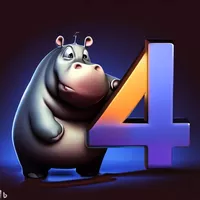4 - The hippopotamus
4 - Das Nilpferd
4 - Ο ιπποπόταμος
4 - El hipopótamo
4 - L'hippopotame
4 - カバ
4 - Het nijlpaard
4 - Hipopotam
4 - O hipopótamo
4 - Бегемот
4 - Su aygırı
4 - Бегемот
4 - 河马
4 - 河馬
The hippopotamus, or hippo, lives in the hot part of Africa.
カバはアフリカの暑い地域に生息している。
Бегемот, или гиппопотам, обитает в жаркой части Африки.
Hà mã hay hà mã sống ở vùng nóng của Châu Phi.
It is a mammal.
It is a mammal.
哺乳類である。
Это млекопитающее.
That is, its babies are born alive, and they drink milk from the mother's body.
Das heißt, ihre Babys werden lebend geboren und trinken Milch aus dem Körper der Mutter.
つまり、赤ん坊は生きて生まれ、母親の体から乳を飲む。
Ou seja, os seus bebés nascem vivos e bebem leite do corpo da mãe.
То есть его детеныши рождаются живыми и пьют молоко из тела матери.
Yani, yavruları canlı doğar ve annenin vücudundan süt içerler.
Nghĩa là, những đứa con của nó được sinh ra còn sống và chúng uống sữa từ cơ thể người mẹ.
The hippopotamus is a large animal.
カバは大きな動物だ。
O hipopótamo é um animal de grande porte.
Бегемот - крупное животное.
Hà mã là một loài động vật lớn.
It weighs four tons.
重さは4トン。
Его масса составляет четыре тонны.
Its stomach is seven meters long, and it eats only plants.
Son estomac mesure sept mètres de long et il ne mange que des plantes.
胃の長さは7メートルもあり、植物しか食べない。
Длина его желудка составляет семь метров, и питается он исключительно растениями.
Midesi yedi metre uzunluğundadır ve sadece bitkilerle beslenir.
Dạ dày của nó dài bảy mét và chỉ ăn thực vật.
It is a mammal, but it spends a lot of time in the water.
C'est un mammifère, mais il passe beaucoup de temps dans l'eau.
哺乳類だが、水中で過ごす時間が長い。
Это млекопитающее, но оно проводит много времени в воде.
Nó là loài động vật có vú nhưng dành nhiều thời gian ở dưới nước.
During the day, it sleeps beside a river or a lake.
Pendant la journée, il dort au bord d'une rivière ou d'un lac.
日中は川や湖のそばで眠る。
Днем он спит у реки или озера.
Gün boyunca bir nehir ya da göl kenarında uyur.
Sometimes it wakes up.
Parfois, il se réveille.
時々目を覚ます。
Por vezes, acorda.
Иногда она просыпается.
Then it goes under the water to get some plants for food.
Ensuite, il va sous l'eau chercher des plantes pour se nourrir.
その後、餌となる植物を得るために水中に潜る。
Depois vai para debaixo de água buscar algumas plantas para se alimentar.
Затем он уходит под воду, чтобы добыть растения для питания.
Sau đó nó lặn xuống nước để lấy một số cây làm thức ăn.
It can close its nose and stay under water for ten minutes.
Il peut fermer son nez et rester sous l'eau pendant dix minutes.
鼻を閉じて10分間水中にとどまることができる。
Pode fechar o nariz e ficar debaixo de água durante dez minutos.
Он может закрыть нос и находиться под водой в течение десяти минут.
Burnunu kapatabilir ve on dakika boyunca suyun altında kalabilir.
Nó có thể bịt mũi và ở dưới nước trong mười phút.
Its ears, eyes, and nose are high up on its head.
Ses oreilles, ses yeux et son nez sont placés très haut sur sa tête.
耳、目、鼻は頭の高いところにある。
As orelhas, os olhos e o nariz estão no alto da cabeça.
Уши, глаза и нос расположены высоко на голове.
Kulakları, gözleri ve burnu başının yukarısındadır.
Tai, mắt và mũi của nó cao trên đầu.
It can stay with its body under the water and only its ears, eyes, and nose above the water.
Er kann mit seinem Körper unter Wasser bleiben und nur seine Ohren, Augen und Nase über Wasser halten.
Il peut rester avec son corps sous l'eau et seulement ses oreilles, ses yeux et son nez au-dessus de l'eau.
体は水中に潜り、耳、目、鼻だけが水面上に出ていることができる。
Pode ficar com o corpo debaixo de água e apenas as orelhas, os olhos e o nariz acima da água.
Он может находиться под водой всем телом, а над водой - только ушами, глазами и носом.
Vücudu suyun altında ve sadece kulakları, gözleri ve burnu suyun üzerinde kalabilir.
Nó có thể giữ cơ thể ở dưới nước và chỉ có tai, mắt và mũi ở trên mặt nước.
Then it can breathe the air.
Il peut alors respirer l'air.
そうすれば、空気を吸うことができる。
Depois pode respirar o ar.
Тогда он сможет дышать воздухом.
O zaman havayı soluyabilir.
Sau đó nó có thể hít thở không khí.
At night, the hippo walks on the land and looks for food.
La nuit, l'hippopotame se promène sur la terre et cherche de la nourriture.
夜になるとカバは陸地を歩き、餌を探す。
Ночью бегемот ходит по земле и ищет пищу.
Su aygırı geceleri karada yürür ve yiyecek arar.
Vào ban đêm, hà mã đi dạo trên đất liền và tìm kiếm thức ăn.
It never goes very far from the water.
Il ne s'éloigne jamais beaucoup de l'eau.
水から遠く離れることはない。
Nunca se afasta muito da água.
Он никогда не отходит далеко от воды.
Sudan asla fazla uzaklaşmaz.
Nó không bao giờ đi quá xa mặt nước.
A baby hippo often stands on its mother's back.
Un bébé hippopotame se tient souvent sur le dos de sa mère.
カバの赤ちゃんはよく母親の背中に乗る。
Um hipopótamo bebé fica frequentemente de pé nas costas da mãe.
Детеныш бегемота часто стоит на спине своей матери.
Yavru bir su aygırı genellikle annesinin sırtında durur.
Hà mã con thường đứng trên lưng mẹ.
The mother looks for food underwater.
La mère cherche de la nourriture sous l'eau.
母親は水中で餌を探す。
A mãe procura comida debaixo de água.
Мать ищет пищу под водой.
Chim mẹ tìm kiếm thức ăn dưới nước.
The baby rides on her back above the water.
Le bébé se déplace sur le dos au-dessus de l'eau.
赤ちゃんは背中に乗って水の上にいる。
O bebé cavalga de costas sobre a água.
Ребенок катается на спине над водой.
Bebek suyun üzerinde sırtında geziniyor.
Em bé cưỡi trên lưng cô trên mặt nước.

